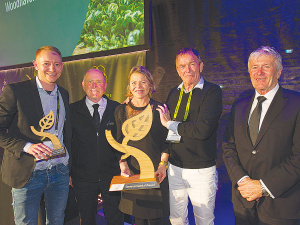Farmer slams GM review as going "too far, too fast"
A Hawke’s Bay fruit and vegetable grower has described the Government’s plan to review regulations around genetic modification as rushed.
 Woodhaven Gardens director Jay Clarke (left), HortNZ chair Barry O’Neill, Emma Clarke, managing director John Clarke and Agriculture Minister Damien O’Connor at the Hort awards night.
Woodhaven Gardens director Jay Clarke (left), HortNZ chair Barry O’Neill, Emma Clarke, managing director John Clarke and Agriculture Minister Damien O’Connor at the Hort awards night.
For one of the country’s largest vegetable growers, sustainable farming has always been a priority.
Horowhenua-based family business, Woodhaven Gardens, has always tried to be sustainable “in the true sense of the word”, according to director, Emma Clarke.
“For us, sustainability has been looking after all four pillars – environment, social, cultural, and economic,” she told Hort News.
At the recent HortNZ conference, Woodhaven Gardens picked up the Environmental Award. On hand to receive the award was founder John Clarke and his children, Emma and Jay.
The judges noted that Woodhaven Gardens are leaders in sustainable growing, investing significantly in reducing environmental impact, adopting a science-led approach that balances conservation with commercial success.
“The Clarkes are leaders in research for the vegetable industry – contributing time, money and land in order to measure and provide evidence.
“Their largescale fresh vegetable growing operation is driving change in environmental sustainability, shifting growing areas to reduce nitrogen loss and minimise the impact on freshwater quality.”
Woodhaven Gardens are no strangers to winning awards; last year they were named the 2020 regional supreme winner at the Horizons Ballance Farm Environment Awards.
“It is frustrating given the fact we now have won multiple awards both environmental and business – yet we are unable to get consent in our region due to the process being stalled yet again,” she says.
The 720ha Woodhaven Gardens was established in 1978 and has been family owned and operated since.
Based just south of Levin on the fertile plains of the Horowhenua, it employs over 260 people at the peak of the Zucchini season.
Clarke says they grow a full range of product – more than 20 different types of vegetable, ranging from fennel and celeriac to green and red cabbage, broccoli, and lettuce.
“We do a naked vegetable as well as pre-packing those products that are highly vulnerable to shrinkage such as spinach, silver beet and Chinese vegetables.”
Sustainability remains a work in progress, but a lot of the “grunt work” has been done.
“Science in this space is progressing and we are partnering with both Massey University and others to help progress some of this work,” she adds.
Woodhaven was the first vegetable operation in the country to roll out the New Zealand GAP Farm EMS programme – an independently audited farm plan based of scientifically proven best environmental farm practice.
The business has effectively retired close to 20% of the farm to grass swales (riparian planting), as well as introducing cut-and-carry grass and maize production.
“A relatively small, unproductive part of the farm has been planted in pines, and we’ve now come up with a simple yet hugely effective way of dealing with our water discharge from our main wash-and-pack facility.”
Looking forward, Clarke says sustainability will remain a priority despite challenges facing them.
She says they face many challenges, some unique to the horticulture sector and others that most businesses will face.
Labour security, changing policy and compliance – both from central and local government, customer and supermarket price expectation and lack of elasticity in an environment where production and operational costs are ballooning are some of the challenges on her list.
“It is a changing climate and we are learning how to adapt our practises to maximise opportunities and to minimise adverse effects,” she says.
Woodhaven Gardens
Could a breakthrough in fermentation create a new multi-million-dollar export market for shiitake mushroom extracts into China?
Meadow Fresh has created the world's first fantasy sports league powered by real cows.
This year, 'Foodie February' sees potatoes take the spotlight as one of New Zealand's most powerful and versatile food heroes.
A multi-cultural team is helping to establish one of New Zealand's largest plantings of premium eating grapes - while learning each other's languages and cultures along the way.
The World Wide Sires National All Day Breeds Best Youth Camp Best All Rounder plaudit has become family affair, with 2026 Paramount Cup winner Holly Williams following in her sister Zara's footsteps.
DairyNZ is giving New Zealand farmers a unique opportunity to gain hands-on governance and leadership experience within the dairy sector.

OPINION: Meanwhile, red blooded Northland politician Matua Shane Jones has provided one of the most telling quotes of the year…
OPINION: This old mutt has been around for a few years now and it seems these ‘once in 100-year’ weather…